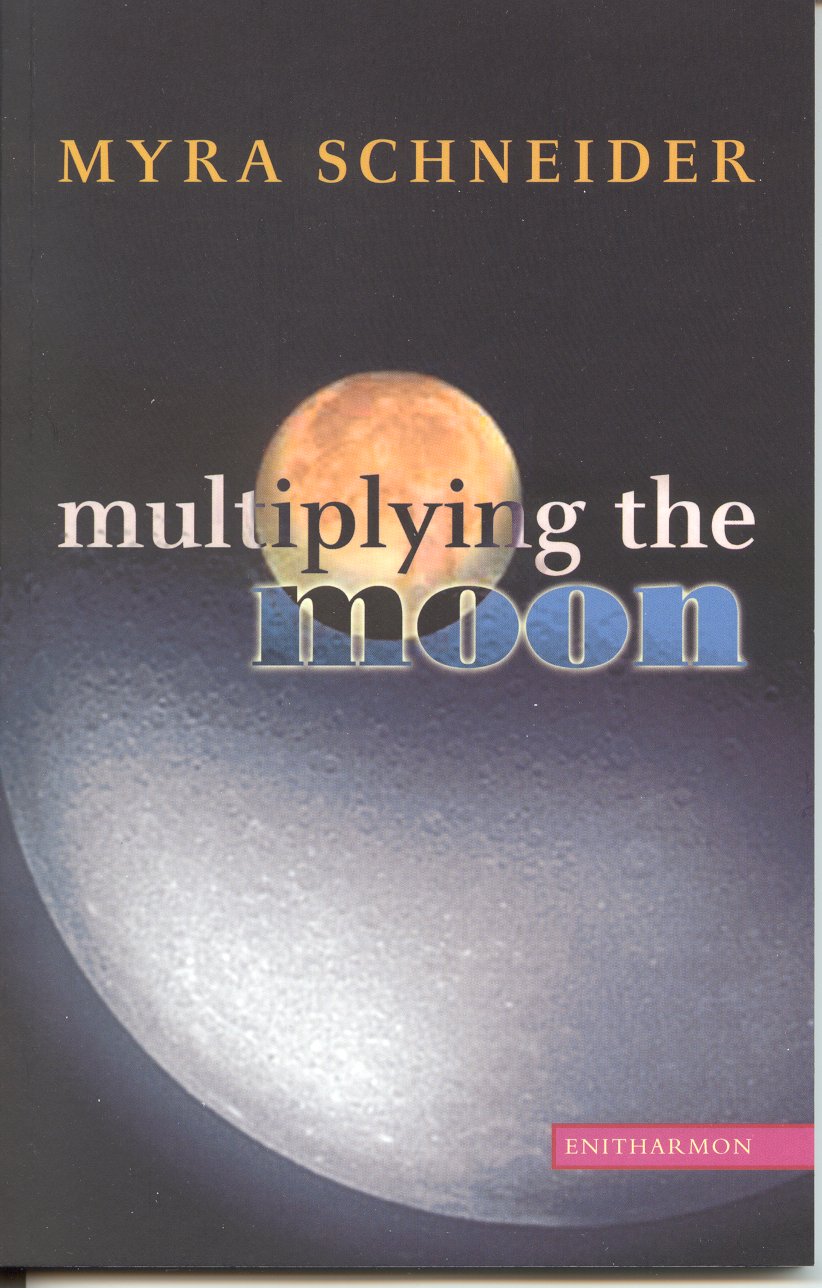
The series of poems which opens 'Multiplying The Moon' are my response to my experience of breast cancer. In the aftermath of this illness I found herself writing poems which explore transience, death and survival from many different angles. Some of these pose questions about the way we are treating this planet and a version of the Orpheus and Eurydice story presents the protagonists as buskers on the London Underground. The main theme of 'Voicebox', the long fictional narrative in the middle of the book, is communication. The poem follows the connections and disconnections between its main characters, one of whom is a disabled lad only able to express himself effectively via a computer.
A short sequence draws on findings from the 1901 census to re-create my father's early life,and the understanding I gain from this which help me feel a new closenes with him. Running throughout this book, which I think is my most ambitious, is the investigation of the self and its relationship with the outside world.
Reviewing the book Hilary Llewellyn-Williams said: 'Her impressive 'Insisting on Yellow' was in preparation as she underwent treatment for cancer...this new collection is still more confiden and powerfully realised. it certainly seems as if her poetry has grown in power through her experiences in the underworld... Another characteristic of these poems is their generosity. Always a poet of huan relationships, with their rewards and difficulties, here Myra Schneider reveals the breadth anddepth of her empathy. It is especially apparent in the two extended (prizewinning) narratives: the Orpheus poem and the sequence at the heart of the book, 'Voicebox'.
Price £8.95
ISBN 1-904634-04-4
Enitharmon
Available from:
Bookshops
Enitharmon
myself
.
Here are two poems from
the book:
MULTIPLYING THE MOON
No opening in the house
is shut
but the heat's a cage I have
to bear.
By the back door where I burnt
my soles this afternoon I long for air
cool as a fish's belly to creep out
of Pymmes Brook up the park slope
to my fence, press the milky smell
of midnight blades to my face. Not
a ruffle, not even the owl
calling like an obsessive ghost
from clots of trees. Upstairs the curtains
are undrawn and I watch my self in a mist
of cotton nightdress that
hides scars,
uneven troughs, veins that have discoloured
skin with spidery purple tributaries.
And there are my other selves, stars
for eyes, leaning towards
the windows:
the one with drive who hoards hope,
the limp moaner, the sympathetic self
and she whose glinting thoughts leap
from the dark of her riverbed.
None
of these can lower the temperature,
slow or speed up time, shrink hatreds
fostered for centuries, feed rain
to thirsty fields, muzzle the snout
of danger or make safe the small
creature always crouched at my core.
Powerless then, have I no power at all?
Pushing a pane to its limit,
I catch
the moon. Across the window bay
a second jumps whitely into
the blue of night. In the glass I hatch
another and another, bat
them from frame
to frame, create a skyful of moons,
ring myself with silver clarity. Cool
begins to whisker the rim of the room.
The House
I am trying to fit you at
four months,
your father, a draper's traveller on his own account,
your mother, your brother David who was twelve,
also Samuel Silverman, a tailor,
his wife, their three children and the boarder,
Woolf Chonen, a boot machinist -
I am trying to squeeze all of you into
that small house, 87 Nelson Street
in the parish of St. Philip Stepney, London.
Ninety years later among
the re-built
and re-numbered buildings I found
a clutch of narrow terraced dwellings
which hadn't been felled by the twentieth century.
Peering into the dim of a bald brown room,
I made out its black range. Everything tallied
with the one up, one down and basement,
the lavatory and pump in the back yard,
which I'd put together from your stories.
Now it's as if you've returned
in full voice
to expound inked facts I've never heard before.
I read them over and over, visualize
how cooking, eating, washing, sleeping,
Yiddish, the Shabbas candles, voices, thoughts,
must have scratched along together, elbowed
for pockets of space, jumbled hopelessly.
And I see how easily it could have happened:
a hand jogged when it was reaching
for the steaming kettle, the spout
tipping water over six-year old Judith,
the unbearable red pain, the scald
of voices. Your sister's name, absent
from the form, is written inside me.
from 'Finding My Father' the 1901 census